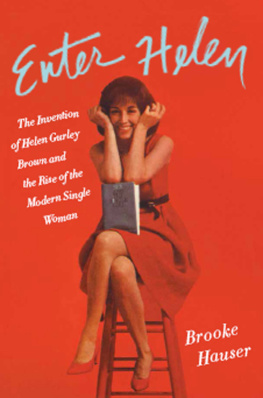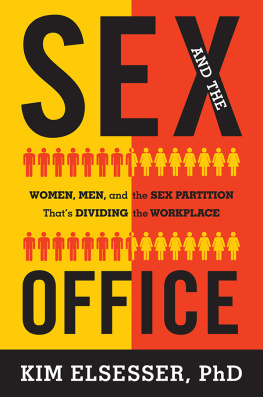SEX AND THE OFFICE
Sex and the Office
JULIE BEREBITSKY
A HISTORY OF GENDER, POWER, AND DESIRE

Society and the Sexes in the Modern World
Christine Stansell, Series Editor
Published with assistance from the foundation established in memory of Philip
Hamilton McMillan of the class of 1894, Yale College.
Parts of first published as The Joy of Work: Helen Gurley Brown, Gender, and Sexuality in the White-Collar Office, in Journal of the History of Sexuality 15, no. 1, pp. 89127. Copyright 2006 by the University of Texas Press. All rights reserved.
Copyright 2012 by Yale University.
All rights reserved.
This book may not be reproduced, in whole or in part, including illustrations, in any form (beyond that copying permitted by Sections 107 and 108 of the U.S. Copyright Law and except by reviewers for the public press), without written permission from the publishers.
Yale University Press books may be purchased in quantity for educational, business, or promotional use. For information, please e-mail sales.press@yale.edu (U.S. office) or sales@yaleup.co.uk (U.K. office).
Designed by Sonia Shannon
Set in Fontshop Scala and Scala Sans type by IDS Infotech Ltd., Chandigarh, India. Printed in the United States of America by
Berebitsky, Julie.
Sex and the office: a history of gender, power, and desire/Julie Berebitsky.
p. cm.(Society and the sexes in the modern world)
Includes bibliographical references and index.
ISBN 978-0-300-11899-5 (cloth: alk. paper)
1. WomenEmploymentUnited StatesHistory20th century. 2. Women employeesUnited StatesHistory. 3. Sex roleUnited StatesHistory20th century.
I. Title.
HD6053.B47 2012
331.40973dc23
2011026337
A catalogue record for this book is available from the British Library.
This paper meets the requirements of ANSI/NISO Z39.481992 (Permanence of Paper).
10 9 8 7 6 5 4 3 2 1
For Woody
CONTENTS
ACKNOWLEDGMENTS
This book and I owe many debts. A John B. Stephenson Fellowship from the Appalachian College Association, for which Cindy Aron graciously agreed to serve as mentor, provided important financial support. A Margaret Storrs Grierson grant from the Sophia Smith Collection, Smith College, a Jessie Ball duPont Grant for Student/Faculty Research, and numerous Faculty Research Grants from Sewanee: The University of the South funded crucial research trips. Sewanees dedicated librarians, especially Kevin Reynolds and ILL staff, Andrew Moser, Sue Armentrout, Heidi Syler, and Cari Reynolds, tracked down every research request, regardless of how obscure, while students Skye Fost, Abby Futrelle, and Ron Allen proved able assistants in libraries and archives. At Yale University Press, Laura Davulis and Christina Tucker promptly and professionally responded to countless emails, which made the final stages of this book much easier, and Dan Heaton edited the manuscript with a sharp eye and keen intelligence.
Colleagues and friendsKevin Murphy, Donna Murdock, Katherine Parkin, Trish Maloney, Sherri Bergman, Andrea Mansker, Paige Schneider, and Betsy Sandlinwho read all or parts of the manuscript were generous with their time and kind with their comments. Christine Stansells commitment to the project was especially significant: her encouragement and careful editing during the final revisions made a daunting task doable.
Most especially, this book and I owe a debt of gratitude to an extraordinarily understanding and supportive group of friends and family. Katherine Parkin and Donna Murdock offered crucial insight and advice on the manuscript, but they also eagerly and patiently listened when I needed to vent about the latest setback in a book that didnt want to get done. Sherri Bergman, Scott Wilson, Houston Roberson, John and Elizabeth Grammer, Chris DeRosa, Margaret Marsh, Rodney Hessinger, Martha Hodes, and Bruce Dorsey provided me with all manner of needed distractions and encouragement. Lisa Hill, Pauline Robert, and my parents patiently understood when I postponed visits because the book was almost done, while Sophie Register never showed even a bit of embarrassment over my work attireeven when her friends were on their way over. Finally, Woody Register read the manuscript, read it again, and then read it some more. His suggestions improved this book, but more important, his love and devotion have made my life infinitely better.
SEX AND THE OFFICE
Introduction
IN 1891 A MEMBER OF THE FIRST GENERATION of white-collar office women published her Memories in the New York Sun. This type-writerthe term referred to the machine and to its operatorhad recently retired from office work to take her place as a wife in a cozy suburban home. The new setting and circumstances had not erased from her memory either the many hours she had spent taking dictation or the risks, and temptations and trials she frequently had faced as a typewriter who possessed beauty of face and form. She recalled the time an older man had chased her around a table. Although he had a look in his eyes, it turned out he was too dignified to do anything violent. On another occasion a young man had subjected her to the indignity of deliberately pinching her cheek. In these early days of her office career, the typewriter had been deeply insulted by the uninvited and unwelcome advances, but she knew her only options were to quit the job she needed or to grin and stay a step ahead of the men chasing her. She chose the latter. In retrospect, she expressed no regrets. From the safety of her married life, she recounted the episodes with a laugh and blamed the mens actions on the novel situation in which the first generation of women clerical workers had found themselves.
Women had initially taken office jobs during the Civil War; by 1870 there were still fewer than two thousand women so employed. As
The typewriter was correct in noting the rapidly growing population of women working in offices, but she was quite mistaken in thinking that the ordinariness and prevalence of women in office work would signal the end either of such misbehavior or of the suspicions about what women really were after when they entered white-collar occupations. Consider that in 1991, a century after the publication of the typewriters memories, more than seventeen million women occupied clerical and administrative support positions in the United States. Another six-plus million worked in offices as lawyers, executives, administrators, and managers. And yet in that same year, the very questions that surrounded the young typewriter in the decades after the Civil WarWere workingwomen fair game for sexual advances? Were they trustworthy employees or disreputable schemers?were directed at the young attorney Anita Hill when she appeared before the Senate Judiciary Committee to testify about her former employer and U.S. Supreme Court nominee Clarence Thomas. A reluctant witness, Hill said that when she had worked for Thomas in the early 1980s, he had pestered her for dates and used work situations to speak graphically about pornographic films and his own sexual prowess. On one occasion, she said, Thomas picked up a can from his desk and asked her, Who has put pubic hair on my Coke? This baffling comment was forever imprinted on the minds of the millions who watched Hills testimony on television. Hill was not a typewriter but an attorney working at a federal agency on projects of importance to her, and she was reluctant to quit. She stated that when Thomas began to show displeasure with her continued rejections, she started to look for another position.
Next page





